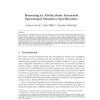Free Online Productivity Tools
i2Speak
i2Symbol
i2OCR
iTex2Img
iWeb2Print
iWeb2Shot
i2Type
iPdf2Split
iPdf2Merge
i2Bopomofo
i2Arabic
i2Style
i2Image
i2PDF
iLatex2Rtf
Sci2ools
113
click to vote
CORR
2008
Springer
2008
Springer
Reasoning in Abella about Structural Operational Semantics Specifications
The approach to reasoning about structural operational semantics style specifications supported by the Abella system is discussed. This approach uses -tree syntax to treat object language binding and encodes binding related properties in generic judgments. Further, object language specifications are embedded directly into the reasoning framework through recursive definitions. The treatment of binding via generic judgments implicitly enforces distinctness and atomicity in the names used for bound variables. These properties must, however, be made explicit in reasoning tasks. This objective can be achieved by allowing recursive definitions to also specify generic properties of atomic predicates. The utility of these various logical features in the Abella system is demonstrated through actual reasoning tasks. Brief comparisons with a few other logic based approaches are also made.
Related Content
| Added | 09 Dec 2010 |
| Updated | 09 Dec 2010 |
| Type | Journal |
| Year | 2008 |
| Where | CORR |
| Authors | Andrew Gacek, Dale Miller, Gopalan Nadathur |
Comments (0)

